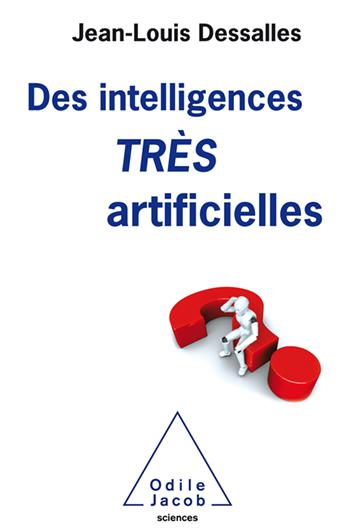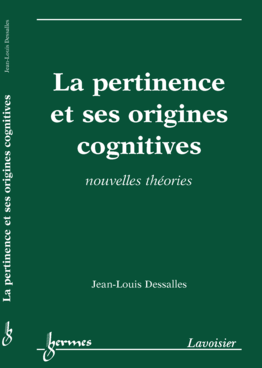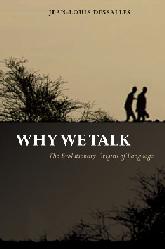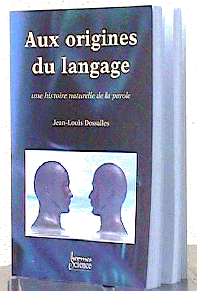Jean-louis Dessalles - Publications [See all papers] - [Selected Papers] - [Talks]
See also Books:







 Topics
Topics
 Social signals
Social signals
Evolutionary origins of language
Evolution and information
Simplicity Theory
Cognitive modelling of interest
Cognitive modelling of relevance
Cognitive modelling of meaning
Cognitive modelling of emotional intensity
Cognitive modelling of concept learning
Emergence as complexity drop
Qualia cannot be epiphenomenal
→ [ See all papers ] → [ Selected papers ]
Selected topic: Qualia cannot be epiphenomenal
| I showed that phenomenal consciousness cannot be an epiphenomenon.
The argument is indirect and does not infringe on the "hard problem" of the so-called explanatory gap. |
My 4 papers about CONSCIOUSNESS (but see my other papers)
-
Dessalles, J.-L. (2001). Qualia and spandrels: an engineering perspective. Paris: Technical Report ENST 2001-D-012.
Keywords: CONSCIOUSNESS
A number of concepts are included in the term ‘consciousness’. We choose to concentrate here on phenomenal consciousness, the process through which we are able to experience aspects of our environment or of our physical state. We probably share this aspect of consciousness with many animals which, like us, feel pain or pleasure and experience colours, sounds, flavours, etc. Since phenomenal consciousness is a feature of some living species, we should be able to account for it in terms of natural selection. Does it have an adaptive function, or is it an epiphenomenon ? We shall give arguments to reject the second alternative. We propose that phenomenal properties of consciousness are involved in a labelling process that allows us to discriminate and to evaluate mental representations. We also discuss to what extent consciousness as such has been selected for this labelling function.
→ Download PDF Share: -
Dessalles, J.-L. & Zalla, T. (1998). On the evolution of phenomenal consciousness. Paris: Technical Report ENST-98-D-001.
Keywords: CONSCIOUSNESS
A number of concepts are included in the term ‘consciousness’. We choose to concentrate here on phenomenal consciousness, the process through which we are able to experience aspects of our environment or of our physical state. We probably share this aspect of consciousness with many animals which, like us, feel pain or pleasure and experience colours, sounds, flavours, etc. Since phenomenal consciousness is a feature of some living species, we should be able to account for it in terms of natural selection. Does it have an adaptive function, or is it an epiphenomenon ? We shall give arguments to reject the second alternative. We propose that phenomenal properties of consciousness are involved in a labelling process that allows us to discriminate and to evaluate mental representations. We also discuss to what extent consciousness as such has been selected for this labelling function.
→ Download PDF Share: -
Dessalles, J.-L. & Zalla, T. (1998). Phenomenal consciousness as phenotype. In T. Metzinger (Ed.), Abstracts of the Conference ‘Neural Correlates of Consciousness, 19-20. Bremen: Hanse Wissenschaftskolleg.
Keywords: CONSCIOUSNESS
The question of the epiphenomenality of consciousness can be addressed from an evolutionary perspective. If phenomenal consciousness is not an evolutionary epiphenomenon, but is it part of our phenotype, we should conclude that consciousness is not a functional or neuronal epiphenomenon.
→ Download PDF Share: -
Dessalles, J.-L. (1996). Pensée privée et communication sociale. In J. Stewart, J.-L. Dessalles & T. Fuhs (Eds.), Du collectif au social - Actes des journées de Rochebrune, 49-59. Paris: ENST.
Keywords: CONSCIOUSNESS
Le fonctionnement cognitif d’un individu et le fonctionnement de la communication sociale sont deux phénomènes soumis à des contraintes assez différentes. Il n’est donc pas évident d’imaginer un parallélisme étroit entre ces deux processus. Pourtant la question de la parenté entre la pensée et le langage a été maintes fois abordée : pensons-nous avec des mots, la pensée est-elle un langage intériorisé, le langage précède-t-il la pensée chez l’enfant, etc. ? Je propose aussi d’aborder cette question, mais sous un angle original. La caractéristique du langage qui est retenue ici n’est pas la faculté d’agencer des mots pour produire des phrases qui évoquent une signification. Si l’on regarde le langage au niveau pragmatique, en retenant seulement de la faculté langagière le fait qu’elle permet d’enchaîner des arguments pertinents, alors force est de constater, dans le détail, une forte similitude entre le déroulement du flux de la pensée et celui de la communication sociale par excellence : la conversation. En d’autres termes, je suggère que l’enchaînement des pensées obéit aux contraintes de pertinence. Si l’on accepte de considérer une telle hypothèse, alors on doit envisager la possibilité que la structure de la pensée privée, constitutive de l’intelligence des individus humains, soit phylogénétiquement une conséquence des exigences de la communication sociale.
→ Télécharger une version PDF de cet article Share: